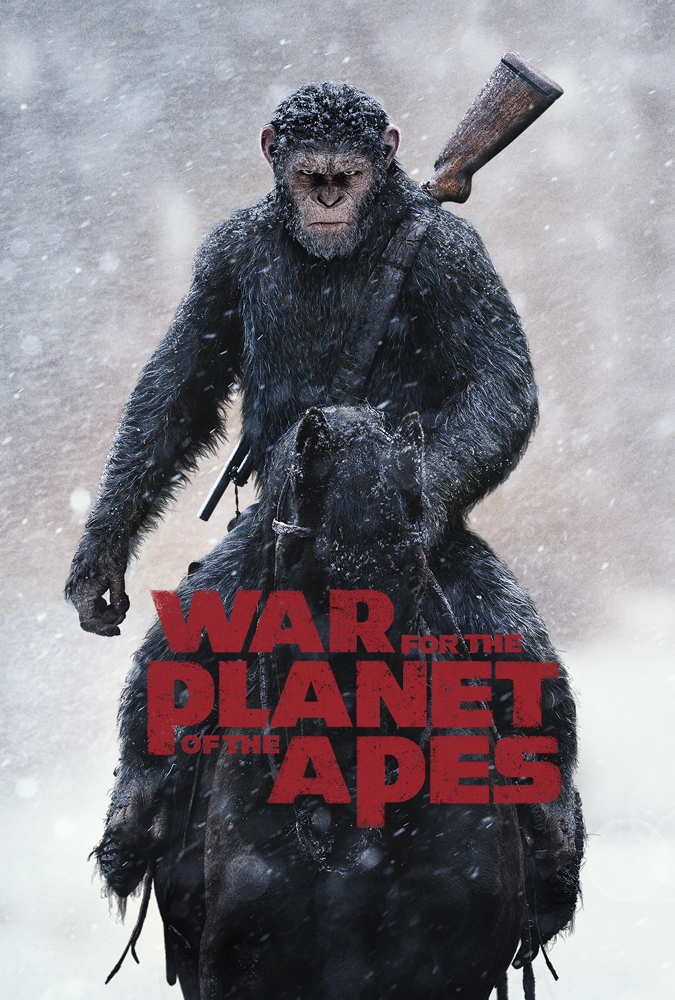Review by Chlo Hickson
Now we come to the final movie in the trilogy, but it’s probably not the movie people were expecting – more on that later. I will be writing one more review regarding the Caesar trilogy before going to see Kingdom of the Planet of the Apes in cinema on the 9th of May but before that here is my review for War for the Planet of the Apes.
For me this movie takes everything the first two movies did and wraps it up in simply profound ways. This movie fuses emotion and character drama into every frame. It’s still one of the most deeply affecting movies that I’ve seen. This is the perfect conclusion to the perfect trilogy.
So where to start?
I’m blown away by the CGI. As good as the previous films are the CGI is the best in the trilogy in this movie. The effects are flawless, so perfect that I never once actually saw CGI. The effects are groundbreaking. It’s the special effects that honestly deserve the most praise, that the apes look so real and that it is hard to believe they were made with motion capture. Characterization for them is every bit as incredible. When they communicate, they don’t need to say much and it is the most detailed the film gets, when saying or doing little – as little as a glance or a gesture – it still feels like they’re saying a lot.
Just as excellent is the character and performance of Caesar. He has always been a hugely relatable and complex character and is much more compelling than any of the human characters in the trilogy. You can really root for him, he is immaculately designed and remarkably detailed in how he moves and communicates, and he actually feels real. You can’t talk about any of these movies without mentioning Andy Serkis, he gives an intensely moving portrayal of Caesar, definitely deserving of award recognition. I find it completely bizarre that they didn’t get any rewards for these movies.
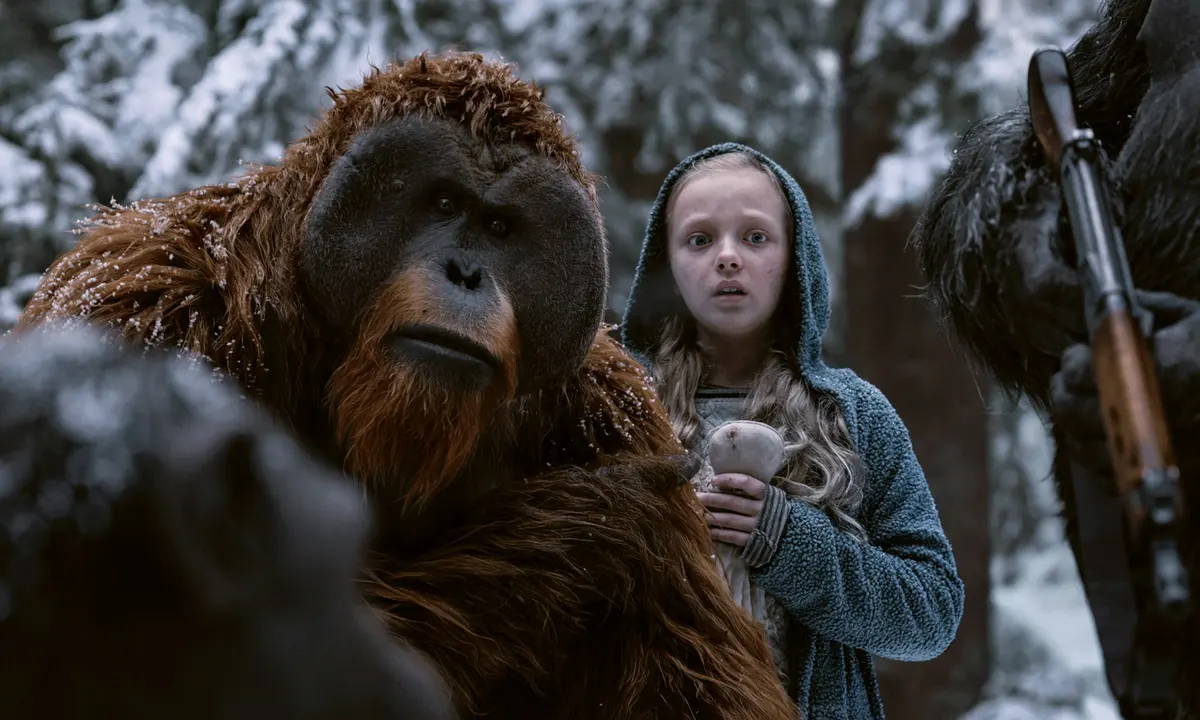 Understandably some people didn’t like this movie because they were expecting a full on war movie, and it is that, but its a commentary about how a person has a war within themselves when war is happening around them. People either missed this, didn’t care, or didn’t understand the more darker themes about the movie. Everyone thought this movie was about a war, the trailers and the synopsis and the titles themself sound like War for the Planet of the Apes is going to be some epic tale of the ape’s vs the humans but then we’re met with this moment: The death of Blue Eyes and Cornelia. Caesar’s son and wife dead by the hands of the colonel he was told to fear, but it’s this moment that really hits. The impulsive fear and anger of Caesar melting away as he cries with his youngest son.
Understandably some people didn’t like this movie because they were expecting a full on war movie, and it is that, but its a commentary about how a person has a war within themselves when war is happening around them. People either missed this, didn’t care, or didn’t understand the more darker themes about the movie. Everyone thought this movie was about a war, the trailers and the synopsis and the titles themself sound like War for the Planet of the Apes is going to be some epic tale of the ape’s vs the humans but then we’re met with this moment: The death of Blue Eyes and Cornelia. Caesar’s son and wife dead by the hands of the colonel he was told to fear, but it’s this moment that really hits. The impulsive fear and anger of Caesar melting away as he cries with his youngest son.
This isn’t what I expected this film to be, I don’t think anyone did, and I certainly don’t think anyone expected the story to end up here when they watched Rise. What War does is take this majestic camera work, this extremely grounded production design and this incredible vision and it makes the most immensely intimate Apes movie to date. A film that takes the time to let you sit with Caesar and his anger and his grief. A film that opens with a giant battle for the sake of showing you how it affects Caesar.
Rise and Dawn were Caesar’s movies in the end, but he was still sharing the plot with the other characters. Here, with a few exceptions, Caesar is the focus of every scene. This movie isn’t about a war, this movie is about Caesar’s pain.
Caesar believes that he must go alone to face the Colonel but that doesn’t prevent others from joining him, there are three apes that join him. The orangutan Maurice, the chimpanzee Bad Ape and the gorilla Luca. It’s important to recognise these three characters and the importance they have to the story. Maurice is the moral compass Caesar needs in his darkest time; we see this when the group come to the home of a human man. After Caesar kills the man before he can kill them, they hear a noise from inside the home, there’s someone else here. They go inside and what they find is a terrified human child and while Caesar, Rocket and Luca aim their guns at the child Maurice is the one who urges them to put their weapons down, and while the rest of them search the house Maurice does what he can to comfort the girl. Handing her a blood-stained doll with no face he found on the ground and then he realises that she can’t speak, without someone to help her Maurice knows that if they leave her behind, she will not survive. In this movie Maurice becomes the embodiment of compassion. He takes on a parental role to this kid, refusing to allow Caesar to leave her behind. Helping this child has far more potential consequences for them but Maurice does it anyway with the warmth and tenderness that defines him as a character, this is exactly what compassion is and requires. Compassion cannot be born from hatred, compassion cannot be born from anger or aggression, it only results from sympathy, care and patience. What we’re seeing in Caesar is that he’s losing that.
When the group come across the military camp they find Winter, an ape that betrayed them and understandably Caesar has no patience or sympathy for him. I don’t think Caesar wanted to kill Winter in that scene, he covers his mouth to stop him from revealing them not to kill him and he seems surprised when Winter goes limp in his arms, but you do have to do more then cover someone’s mouth to suffocate them. I think in the moment he just didn’t care. He was angry, he was resentful, the dead bodies of his wife and son are still fresh in his mind and this was the ape whose fear got them killed. The warmth of Maurice isn’t here in Caesar, this is cold.
But they continue. Winter’s death is just another causality of war, Caesar can’t allow himself to care. So, he doesn’t.
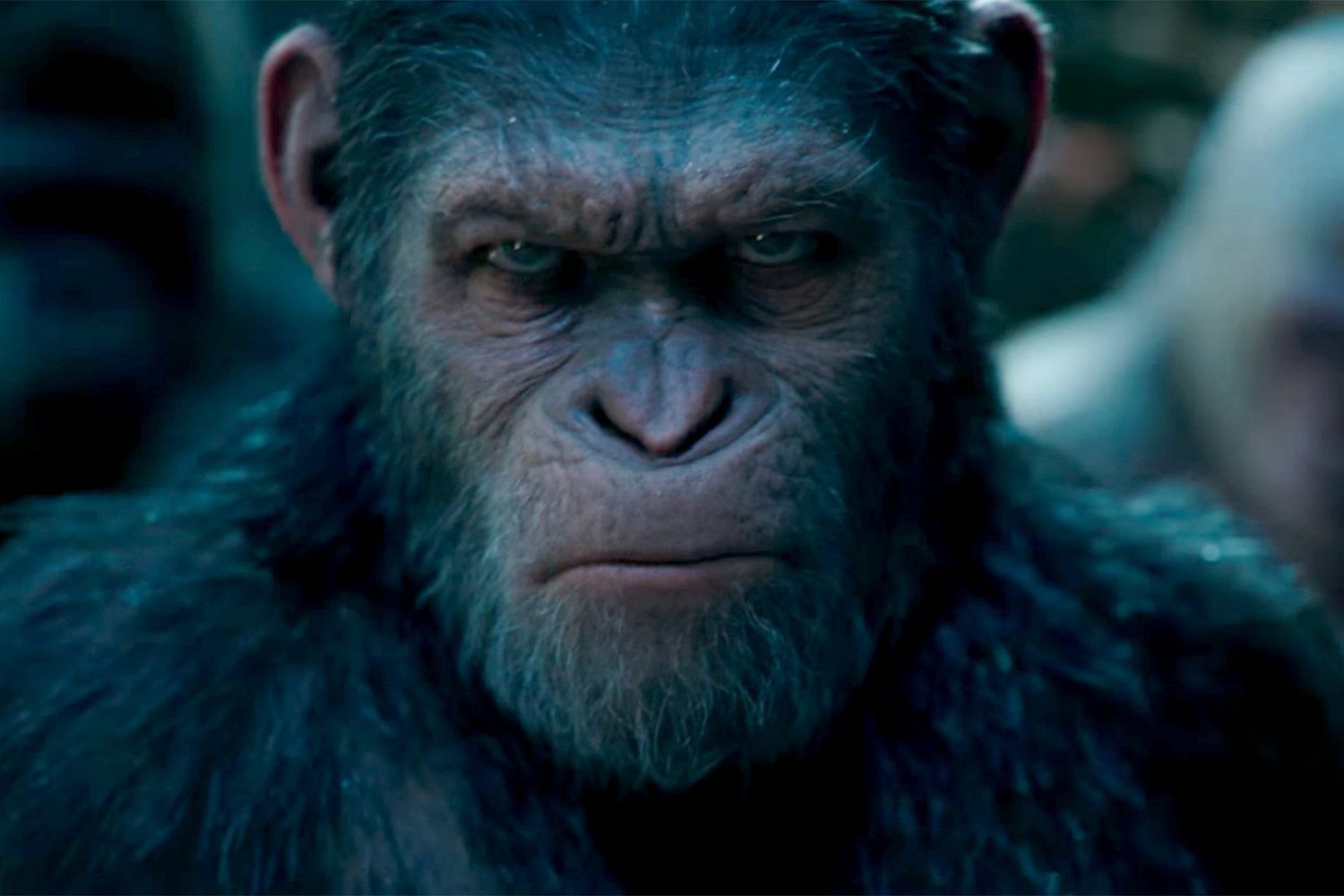 The second ape comes as a surprise to everyone. Bad Ape should have ruined the movie, a depressing, cold, revenge story. This character can best be described as silly. The idea behind Bad Ape came from the fact that if apes can pass the Simian Flu to humans and humans can give it to each other, then why couldn’t they give it to apes. Quickly after meeting him, we get a sense of what Bad Ape embodies. Bad Ape is empathy, the ability to share the feeling of another and more than that the ability to act on it. He sees and understands that the child is cold, so he gives her his coat because he knows what it’s like to feel cold himself. Even though he can speak, he’s not the smartest character and that makes him the comedy of the film. Empathy drives every decision Bad Ape makes. Child is cold, here’s my coat. Friends are angry, she can keep. You had child, I had child. When we look at Caesar, we get a different story. We don’t get an ape who’s making a decision based on how others feel, we’re getting one that doesn’t seem to be noticing how Bad Ape feels at all. Or like with Winter he doesn’t seem to care. When we look at Caesar, he doesn’t seem to care that the little girl is cold, that Bad Ape is afraid to return to the human zoo. He doesn’t even respond to the fact that Bad Ape had a child too. Instead of showing the same empathy, the best Caesar can do is a slight turn of the head to acknowledge it. Caesar doesn’t care.
The second ape comes as a surprise to everyone. Bad Ape should have ruined the movie, a depressing, cold, revenge story. This character can best be described as silly. The idea behind Bad Ape came from the fact that if apes can pass the Simian Flu to humans and humans can give it to each other, then why couldn’t they give it to apes. Quickly after meeting him, we get a sense of what Bad Ape embodies. Bad Ape is empathy, the ability to share the feeling of another and more than that the ability to act on it. He sees and understands that the child is cold, so he gives her his coat because he knows what it’s like to feel cold himself. Even though he can speak, he’s not the smartest character and that makes him the comedy of the film. Empathy drives every decision Bad Ape makes. Child is cold, here’s my coat. Friends are angry, she can keep. You had child, I had child. When we look at Caesar, we get a different story. We don’t get an ape who’s making a decision based on how others feel, we’re getting one that doesn’t seem to be noticing how Bad Ape feels at all. Or like with Winter he doesn’t seem to care. When we look at Caesar, he doesn’t seem to care that the little girl is cold, that Bad Ape is afraid to return to the human zoo. He doesn’t even respond to the fact that Bad Ape had a child too. Instead of showing the same empathy, the best Caesar can do is a slight turn of the head to acknowledge it. Caesar doesn’t care.
And then we have our third ape, Luca. What Luca embodies is selflessness. After giving his life to save Caesar, how does Caesar respond? No tears, no grief. I’m sure he’s sad but that’s not what overtakes him at this point. Its anger, its fear and its hatred. Fear that its his fault, hatred towards humans. When Caesar says ‘They must pay’ it sounds a lot like Koba.
Caesar doesn’t care. Caesar’s pain, his exhaustion, his grief, his anger, his hatred… Its changed him. It sent him down the same path that Koba went down. Koba had no compassion, Koba had no selflessness, Koba was afraid and hateful and angry and now Caesar is all of that. The things that defined Caesar are slipping away and are being replaced by the things that defined Koba.
Caesar’s the villain of this story.
Let’s focus on the line from Dawn for a sec. ‘You are not Ape’. Caesar was disowning Koba as an ape because he failed to live up to the ideal of what an ape was supposed to be, but in War this line takes on a new meaning. Its similar in how we de-humanise the irredeemable monsters, they went too far so they aren’t human because if they were that means anyone can do exactly the same. In Rise the villain was a human, in Dawn it was an ape and in War its Caesar.
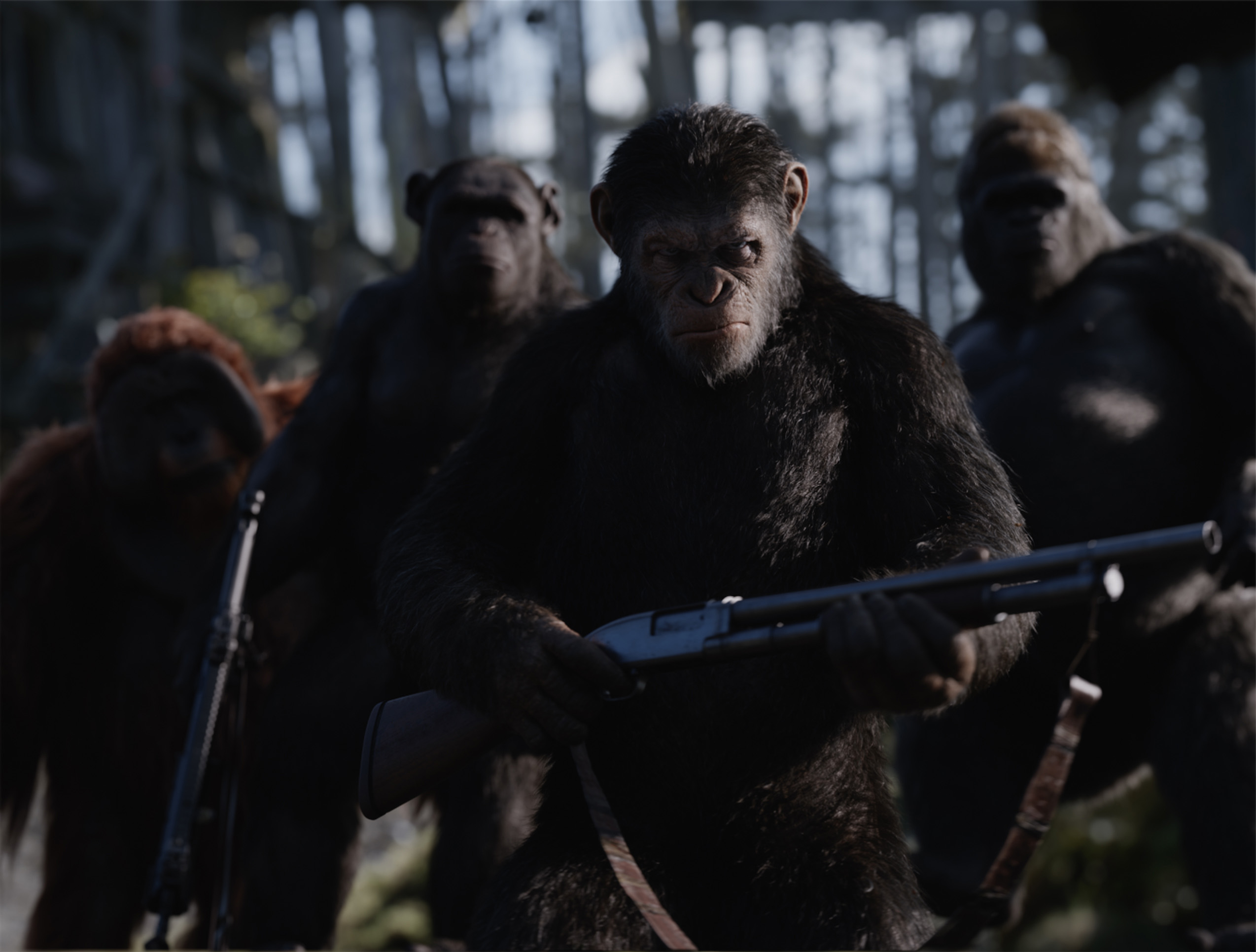 And the consequences of that fall are disastrous. Caesar abandoned his people, left his only son when he needed him the most to pursue a vengeance on humanity because after two years of watching his people die just because of existing, Caesar broke. And now all he can do is look at what he’s caused, his people turning their backs on him, his son crying out for him and all he can say is ‘What have I done?’
And the consequences of that fall are disastrous. Caesar abandoned his people, left his only son when he needed him the most to pursue a vengeance on humanity because after two years of watching his people die just because of existing, Caesar broke. And now all he can do is look at what he’s caused, his people turning their backs on him, his son crying out for him and all he can say is ‘What have I done?’
Caesar’s pride has been his greatest flaw from the start. In Rise it was his lack of it, the lack of his ability to take pride in his own identity as an ape. In Dawn what he gained blinded him to Koba’s intentions and that led to everything falling apart, and in War it is Caesar’ pride in his own status as the savior of the apes that fails him.
Maybe Koba could fall to hatred but not Caesar. For the first time since Rise he’s on the exact same level as the rest of his people, imprisoned and enslaved, forced to build a wall for his captors but when one ape makes a mistake and is whipped and punished, Caesar stands for them. The music builds up, the apes cheer for him, they drop their rocks, their leader, their defiant savior has returned again to save them as he’s done in the past. Caesar has come back. The music dies down, every crack of the whip, every echo leads into a terrible silence and then as Caesar begs for the apes to be given food and water, the ape he was supposed to be standing for is killed. This was supposed to be the moment Caesar came back, the moment he rescued his apes, inspired them to fight back like he did all those years ago but with every crack of the whip the apes get a reminder they have no power, Caesar has no power, the only power they have is to pick up a rock and to continue working. It is this moment Caesar realises he cannot save them. He helped put them in this situation, but he can’t get them out of it, Caesar is no Savior. Caesar fell and now his people are paying the price.
It’s one thing to recognise that those around you, those you know and care about, can fall to hatred and fear but it’s another thing entirely to recognise that in yourself. The last thing we want to believe is that we could ever be the villain of the story.
And through all of this Caesar starts to feel human.
Woody Harrison’s Colonel is one of my favourite antagonists in a movie, in what little screen time he has the Colonel manages to be one of the most complex characters in this trilogy, only rivalled by Caesar himself, the Colonel is written as ruthless and merciless. From the beginning of the film, we’re told to fear him, from the start the Colonel acts as though he is a force of nature, an enigmatic leader, this god to his followers. He is everything to them. He will stop at nothing to destroy the apes once and for all.
And as far as Caesar can tell the reason why is just because he wants to. Caesar doesn’t really know the enemy that he’s fighting, and he doesn’t honestly want too, all he knows is that this enemy is brutally killing his apes. It doesn’t matter why. But there is a reason.
The Simian flu has mutated and instead of killing its host, it renders them almost animal like. Incapable of speech, incapable of higher thinking, this mutation robs humans of their higher intelligence and its the Colonel’s fear that if the mutation spreads humans will become the apes’ cattle. Humanity’s punishment is the apes will become their superiors, and he’s taken it upon himself to be the savior of humanity. The god complex is obvious, sacrificing his only son so that humanity can live. In this way the Colonel is similar to a cult leader.
Let’s look at one of his soldiers, Preacher, a man who was spared by Caesar, whose allegiance is still to the Colonel who wants Caesar dead. Why? Because he’s scared, because they are all scared, because fear is powerful enough to drive us to a narcissistic false god who claims to have all the answers but in reality, is just as scared as everyone else.
The pride in humanity is evident. There was no beginning before humanity or after us, humanity existed for so long not because of our ability to speak but because higher thinking made us aware of the concept of domination. Being compassionate, being empathetic, being selfless. These are the things that result in domination. These are things that can’t be afforded in war. That is what separates humans from animals. The thing is, the Colonel isn’t really wrong.
Planet of the Apes has always been a story of role reversal, the entire concept is role reversal. Humans being treated as apes while apes acted as humans but in War it is slightly more subtle. We see Caesar treat humans throughout the movie with total indifference, he’s watched humans kill and brutalise his people for two years and he has no patience for them anymore. His hatred lies solely with the Colonel that his faith in humanity is deteriorating. I honestly don’t know if Caesar wouldn’t use humans as cattle because throughout this film Caesar is becoming more like the Colonel, more human. The Colonel is prideful, he doesn’t recognise how far he’s fallen because his fear won’t let him see what he’s doing is wrong.
Compassion isn’t human, empathy isn’t human, selflessness isn’t human. Hatred is human, revenge is human, pain is human. Not the ability to feel pain but the capacity to cause it. Love isn’t enough to stop that. To be human is to cause pain. The Colonel has accepted that because what more could there be? To him that is everything. And if that is everything, what worth is there in anything? In the end that’s what Planet of the Apes was trying to tell us.
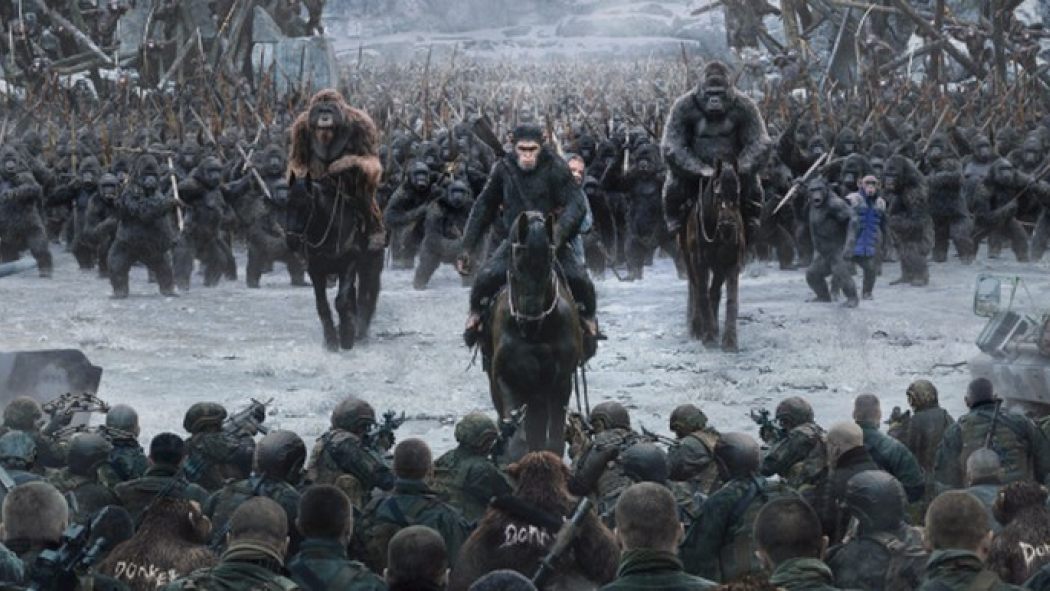 Caesar lies in his cell. Weak, hungry, thirsty and alone. He will die before sunrise. He’s failed his people, he’s failed his family, he’s failed himself. What more can he do but wait to die but then the mute little girl approach’s, the one he wanted to leave behind and she gives him her doll. When she was in shock and terrified another ape gave her that doll to comfort her and now when she sees the ape that killed her dad, alone and dying, she gives him the same doll to comfort him and when she quickly realises his thirst, she holds a bucket of water up for him. She saves him. Caesar looked at the child with indifference, he didn’t even want to help her when she had no one else. Why would he care for a human child when humans never cared for his own family? But she doesn’t show him hatred, she doesn’t leave him behind, she sees someone in pain, and she does what she can to help. She goes to him even though she could get killed if the soldiers find her. She saves Caesar’s life. She shows him compassion, empathy and selflessness and it all started with that little doll. And in this moment the other apes stand for Caesar, they give him a silent showing of support in the sign ‘Apes together strong’. Caesar’s in a cage, lost and alone and the other apes stand for him. Not in a moment of power like in Rise but in a moment of refusal in the way things are, in a moment where Caesar is at his lowest, weakest point, where he has submitted to his fate. He needs the other apes to remind him what he’s fighting for. He needs the little girl to give him food and water and a comforting doll, Caesar has to look up from a place of total weakness to see that he isn’t alone. This little girl taught him that. This little girl who is everything the Colonel fears, this little girl ties everything together, she saves Caesar’s life, gives him a second chance. She changes everything. While her, Bad Ape and Maurice are working on an escape route with the underground tunnels, this little girl asks Maurice a question: ‘Am I ape?’
Caesar lies in his cell. Weak, hungry, thirsty and alone. He will die before sunrise. He’s failed his people, he’s failed his family, he’s failed himself. What more can he do but wait to die but then the mute little girl approach’s, the one he wanted to leave behind and she gives him her doll. When she was in shock and terrified another ape gave her that doll to comfort her and now when she sees the ape that killed her dad, alone and dying, she gives him the same doll to comfort him and when she quickly realises his thirst, she holds a bucket of water up for him. She saves him. Caesar looked at the child with indifference, he didn’t even want to help her when she had no one else. Why would he care for a human child when humans never cared for his own family? But she doesn’t show him hatred, she doesn’t leave him behind, she sees someone in pain, and she does what she can to help. She goes to him even though she could get killed if the soldiers find her. She saves Caesar’s life. She shows him compassion, empathy and selflessness and it all started with that little doll. And in this moment the other apes stand for Caesar, they give him a silent showing of support in the sign ‘Apes together strong’. Caesar’s in a cage, lost and alone and the other apes stand for him. Not in a moment of power like in Rise but in a moment of refusal in the way things are, in a moment where Caesar is at his lowest, weakest point, where he has submitted to his fate. He needs the other apes to remind him what he’s fighting for. He needs the little girl to give him food and water and a comforting doll, Caesar has to look up from a place of total weakness to see that he isn’t alone. This little girl taught him that. This little girl who is everything the Colonel fears, this little girl ties everything together, she saves Caesar’s life, gives him a second chance. She changes everything. While her, Bad Ape and Maurice are working on an escape route with the underground tunnels, this little girl asks Maurice a question: ‘Am I ape?’
After spending so much time with them, traveling with them, she has gotten to the point where she doesn’t even know what she is. Human or ape. Maurice thinks for a moment and tells her ‘You are Nova’. Instead of labeling her as human or ape, Maurice calls her Nova. He gives her individuality.
In the end this movie was only going to end one way. It wasn’t about a war between humans and apes, it wasn’t even about the war between the different groups of humans. It was about the war within Caesar. The Colonel is everything that Caesar could become so the only way this could end was a confrontation between them but when Caesar gets to the Colonel, he finds him ready to die. The Colonel took the doll from Caesar’s cell, and it passed on the muted Simian flu to him, he’s became his greatest fear. So instead of fighting back when Caesar puts a gun to his head he holds it there with him, the Colonel wants Caesar to kill him. They stare each other down before Caesar finally puts the gun down. He spares the Colonel’s life, not because he forgives him but because he sees a man that has lost everything, he sees a broken man that has nothing left. He sees himself. We see what connects Caesar and the Colonel is that they are both people who have failed to forgive themselves.
Caesar sees Nova’s doll, he sees the girl who saved him, the girl who lost her dad and saved her dad’s killer without question. He sees the apes standing for him even though he left them behind. Killing the Colonel would do nothing, even if he does there’s no turning back. There won’t be anything left of Caesar to forgive. He’d be the Colonel that killed his family. Caesar wanted to kill the Colonel not because of any sense of true hatred, just like Koba didn’t do what he did because he hated humans. Caesar wanted to kill the Colonel, but the Colonel was his failure, his inability to save his family and his people, if he’d just killed the Colonel maybe then he could be forgiven but that’s the problem: Death and destruction have never solved anything. Maybe it’ll give you a temporary sense of peace but then Caesar’s family is still dead. He still failed; he still fell. If he killed the Colonel what hope is there for anyone? The one thing he can do is put the gun down and forgive himself. That’s the hardest thing anyone can ever do. It’s so much harder than pulling a trigger because deep down we know we don’t deserve to be forgiven but if one little girl is willing to show us love after everything we’ve done, maybe there’s hope for us after all.
But the Colonel can’t show mercy to himself, so he takes the gun and Caesar watches as the Colonel pulls the trigger. It wasn’t the doll that killed him, it was his unwillingness to accept himself as anything but human.
At the end of this movie Caesar and Maurice have one final talk. Maurice realises that Caesar has been fatally wounded and is going to die but Caesar tells him to not worry. Caesar began this story coming from privilege, finding pride in his identity in being an ape and promising that his kind would get to go home. He’s gone through trial after trial through Landon, Jacobs, Koba, Dreyfus, the Colonel and himself. Now he’s here at the promised land and even though he won’t get to live in it himself, he gets to die knowing that his people will finally be allowed to live in peace.
Caesar’s legend will live on, the lessons he learnt will be passed down by the apes he saved.
Considering all this, War for the Planet of the Apes is a war film that puts character drama as the main focus to tell a stunningly captivating personal story. It’s a masterfully crafted movie heavily complicated with marvelous performances and a beautiful score. I wouldn’t call this a fun movie as its honestly bleak and depressing. This is a movie all about hate and revenge. You have to be in the right mood. I think War is the same as Dawn in terms of quality and filmmaking, but overall Dawn is my favourite in the trilogy. Also War is a better film than Rise, but I think in terms of re-watchability that I like Rise much more then War. The greatest part of this movie is the brilliant, captivating, game changing performance by Andy Serkis. He changes what acting can do, his performance is honestly one of the best of all time.

